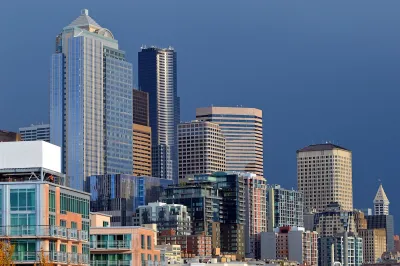Washington’s statewide cap on annual residential rent increases will be just shy of 10 percent next year, down slightly from its current level.

This story by Jake Goldstein-Street was originally published in Washington State Standard.
The limit, which takes effect Jan. 1, will be set at 9.683 percent, the state’s Department of Commerce said Friday.
House Bill 1217, signed into law in May by Gov. Bob Ferguson, restricts annual residential rent increases to 7 percent plus inflation, or 10 percent whichever is lower.
The law went into effect immediately, with the rate for the rest of 2025 set at the 10% maximum, as 7 percent plus inflation equaled 10.8 percent.
Going forward, the Department of Commerce will announce the annual rent limit each July. The timing is based on the release of inflation data from the U.S. Bureau of Labor Statistics.
Rent hikes of any degree aren’t allowed in the first year of a tenancy under Washington’s landmark law. But landlords can set rent however they please when the tenant moves in.
The cap doesn’t apply to all homes. For example, new construction is not covered for its first 12 years. Public housing authorities, low-income developments, and duplexes, triplexes and fourplexes in which the owner lives in one of the units are also exempt.
For manufactured homes, increases are capped at 5 percent.
If a landlord raises rent above the caps without an exemption, the renter must give the landlord a chance to fix the error or can terminate their lease with 20 days’ notice. A tenant or the state attorney general can bring litigation to enforce compliance. The attorney general can recover up to $7,500 per violation.
The legislation was one of the most divisive this session in Olympia. Progressives had initially pushed for a hard 7 percent limit, but ran into opposition from moderate Democrats.
Democrats hope the compromise provides a modicum of predictability to renters. Republicans fear it’ll chill development and price out small landlords who won’t be able to keep up with maintenance costs without the flexibility to raise rents as they wish.
Under the law, the limit on rent increases will remain in effect until 2040.
FULL STORY: WA’s new rent cap set just below 10% for 2026

Planetizen Federal Action Tracker
A weekly monitor of how Trump’s orders and actions are impacting planners and planning in America.

Silicon Valley ‘Bike Superhighway’ Awarded $14M State Grant
A Caltrans grant brings the 10-mile Central Bikeway project connecting Santa Clara and East San Jose closer to fruition.

Amtrak Cutting Jobs, Funding to High-Speed Rail
The agency plans to cut 10 percent of its workforce and has confirmed it will not fund new high-speed rail projects.

Washington’s New Rent Cap Set Just Below 10% for 2026
Washington’s statewide cap on annual residential rent increases will be just shy of 10 percent next year, down slightly from its current level.

Nature Starts Here: The Essential Role of Nature Centers and Outdoor Programs
Nature centers and outdoor programs serve as vital gateways to environmental education, equity, and stewardship — bringing people closer to nature and inspiring the next generation to care for the planet.

Opinion: California Clean Transportation Efforts Not Addressing Needs of Low-Income Residents
The state’s rebate programs for e-bikes and other light electric vehicles are too underfunded to reach many of the Californians who need them most.
Urban Design for Planners 1: Software Tools
This six-course series explores essential urban design concepts using open source software and equips planners with the tools they need to participate fully in the urban design process.
Planning for Universal Design
Learn the tools for implementing Universal Design in planning regulations.
Caltrans
City of Fort Worth
New Jersey Institute of Technology
Mpact (founded as Rail~Volution)
City of Camden Redevelopment Agency
City of Portland
City of Laramie





























